- Continental
- Electronic Stability Control
- ESC
- Anti-lock Brake Systems
- ABS
- Wheel Speed Sensors
- WSS
- Vision Zero
- Anudeep Garg
- Sukhdeep Sandhu
Continental’s Gurgaon Plant Attains New Production Milestone for EBS And WSS
- By MT Bureau
- September 13, 2024
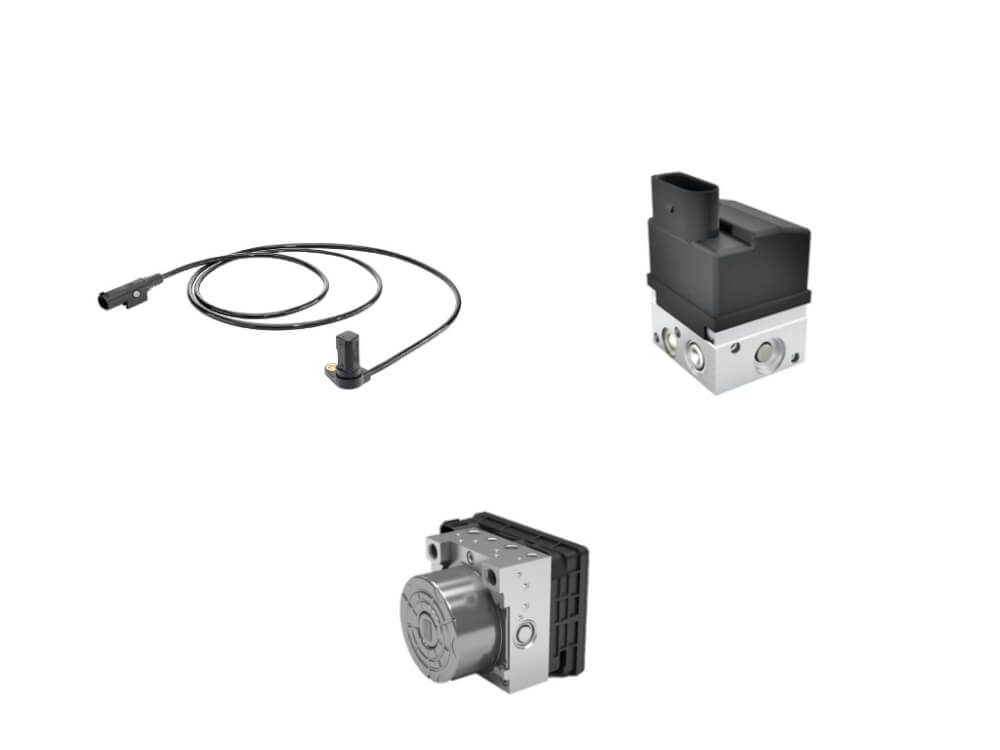
German tier 1 supplier Continental’s Gurgaon plant has attained a new production milestone of producing 10 million Electronic Brake Systems (EBS) and 100 million Wheel Speed Sensors (WSS), two components integral to the safety of a vehicle.
The EBS portfolio comprises Electronic Stability Control (ESC) for passenger cars and Anti-lock Brake Systems (ABS) for both, passenger cars and two-wheelers. It provides directional stability and steerability of the vehicle whereas, ABS aims to avoid locking of the wheels and keeps the vehicle steerable during braking. Additionally, the signals from the WSS are required for control systems like Anti-lock Braking System (ABS) and Electronic Stability Control (ESC).
The company states that over 1.3 million people loose their lives in road accidents worldwide every year and more than 50 million are injured. In India, 53 accidents and 19 deaths occur every hour, or an average of 1,264 accidents and 42 deaths daily due to road crashes, according to a Ministry of Road Transport and Highways report in 2023. To enhance road safety in the country, ABS technology was made mandatory in 2019, followed by a proposal for ESC in 2022 by the government.
Sukhdeep Sandhu, Head of Safety and Motion, Continental Automotive India said, “Safety is non-negotiable. At Continental, we have consistently brought relevant technologies to the market for our customers, helping make vehicles and thereby our roads safer. Our expertise in active and passive safety systems is a key driver in reducing the number of traffic-related fatalities, injuries, and road accidents”.
“Localisation is at the core of company’s strategy in India. Supported by legislations which have played a huge role in ensuring vehicular safety, we have been able to localise both production and R&D, ensuring greater value to our customers in the market. Customers in India are proactive in their adoption approach towards safety technologies”, he added.
Continental’s ‘Vision Zero’ is focussing on ensuring zero road fatalities, injuries and crashes, through technologies, components and systems and ongoing innovations.
The tier 1 supplier is also one of the largest manufacturers of WSS in India. Apart from catering to leading OEMs in India, these components are also exported to other Asian and European regions.
Anudeep Garg, Head of the Gurgaon plant, Continental Automotive India said, “We are proud to achieve this milestone and continue to focus on localisation. As a Tier 1 supplier, we follow global manufacturing standards and have adopted several advanced technologies to create a digital shopfloor. Additionally, industry 4.0 technologies enable us to not only maintain product quality and enhance efficiency but also to effectively streamline our supply chain. We aim to increase the manufacturing capacity of EBS and WSS in double-digit percentages in the next three years for both passenger vehicles as well two-wheelers.”
Continental’s ‘in the market, for the market’ approach has seen its entire value chain from R&D to design and production being localised. This way Continental is focusing on enabling easy access to safety products by adapting globally proven technologies to suit the local market. Wide-scale production offers economy of scale and ensures cost advantage, thereby contributing to increased democratization of safety features in vehicles across segments in India.
It was in 2016, when Continental set up assembly lines in Gurugram for Antilock Brake Systems (ABS) and Electronic Stability Control (ESC) systems for two-wheelers and passenger cars. In 2018, it commenced production for ABS and ESC Electronic Control Units (ECU) at its Bengaluru plant. In the subsequent year, the company achieved the production milestone of one million ABS and ESC ECUs at its Bengaluru plant, and in 2020, reached a milestone of 50 Million Wheel Speed Sensors (WSS) at its Manesar plant. Additionally, Continental entered into a joint venture with Japanese firm Nisshinbo Holdings in 2022, to localise machining for valve blocks for Electronic Brake Systems (EBS) in India.
Nissan To Shut Oppama Plant In Japan, Shift Production To Kyushu Facility As Part Of Restructuring Plan
- By MT Bureau
- July 16, 2025
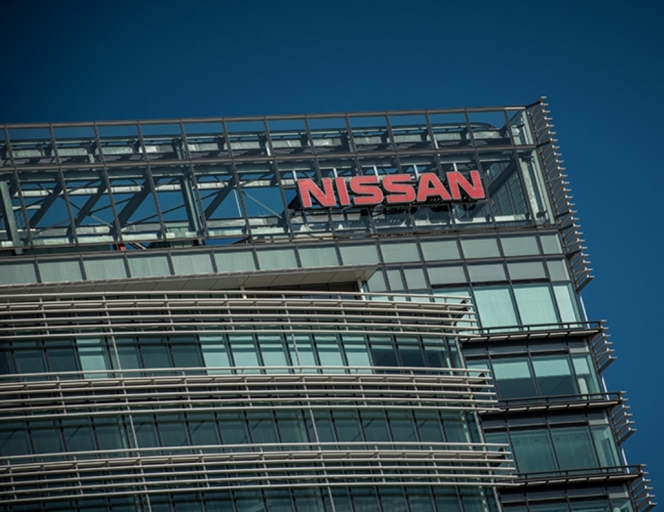
Japanese automaker Nissan Motor Co., which has been undertaking significant measures to improve its financial performance and is restructuring global operations, has announced that it plans to transfer and integrate vehicle production at the Oppama Plant, located in the Oppama district, to Nissan Motor Kyushu Co., Ltd in Fukuoka Prefecture.
This move part of the ‘Re:Nissan’ recovery plan aims to reduce its global production capacity from 3.5 million units (excluding China) to 2.5 million units, while maintaining a plant utilisation rate of around 100 percent. To achieve this, the company has been considering the consolidation of production sites from 17 to 10.
Nissan Reiterates Commitment For India, Targets 200,000 Unit Sales For FY2026
The new announcement will see vehicle production shutting down at Nissan’s Oppama plant at the end of fiscal 2027. Following this, both current and future models scheduled for production at Oppama will be manufactured at Nissan Motor Kyushu.
On the other hand, facilities and functions in the district – such as the Nissan Research Center, Grandrive, the crash test facility and Oppama Wharf – will remain unaffected and continue operations as usual.
Ivan Espinosa, CEO, Nissan Motor Co, said, "Today, Nissan made a tough but necessary decision. It wasn’t easy – for me or for the company – but I believe it’s a vital step toward overcoming our current challenges and building a sustainable future. The Oppama Plant is a proud part of our history, and its legacy will endure. I want to sincerely thank our employees, the local community, and our partners who have supported this plant with dedication and heart. We will continue to operate in the Oppama area with strong support for the local community, as we carry forward the spirit of Oppama plant and work to restore Nissan’s true value."
While the company has announced the shutdown of manufacturing operations at the Oppama plant, it is still exploring a ‘wide range of options to determine the most appropriate path forward’.
The company will continue to retain employees at the plant till the end of fiscal 2027 and is looking to initiate discussions with the union on the future course of action.
Furthermore, the Japanese automaker has also announced that production of the NV200, currently consigned to the Nissan Shatai Shonan Plant, will end in fiscal year 2026. A successor to the NV200 is planned for introduction in fiscal year 2027, with further details to be shared at a later date.
With this decision, Nissan said it has concluded all vehicle production consolidation actions in Japan under the Re:Nissan plan.
Also read: Nissan Secures $6 Billion Through Bond Issuance
- Skoda Auto Volkswagen India
- Skoda India
- Octavia
- Laura
- Superb
- Kodiaq
- Kushaq
- Slavia
- Kylaq
- Andreas Dick
- Piyush Arora
Skoda Auto Volkswagen Rolls Out 500,000th Made In India Skoda Car
- By MT Bureau
- July 04, 2025
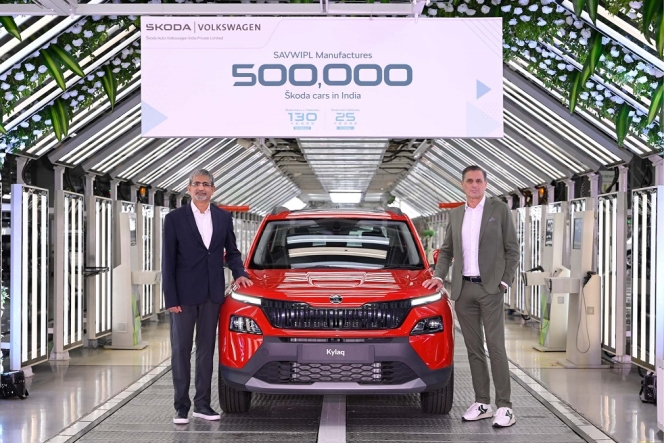
Skoda Auto Volkswagen India has announced that it has achieved a major manufacturing milestone in its operations. The company recently rolled out its 500,000th made-in-India Skoda vehicle.
The milestone comes after 24 years since the company introduced the first Skoda Octavia from its Chhatrapati Sambhaji Nagar facility (formerly Aurangabad) in 2001.
At present, the company manufactures vehicles across two facilities in India – Chhatrapati Sambhaji Nagar and Pune, with them now supporting the company’s new manufacturing plant in Vietnam with parts and components.
Over the years, Skoda has rolled out its iconic products such as Octavia, Laura, Superb and Kodiaq to new products like the Kushaq, Slavia and its first sub-4-meter Kylaq.
Andreas Dick, Board Member for Production and Logistics, Skoda Auto, said, “Reaching the milestone of 500,000 cars produced in India is a proud testament to our strategic vision of unwavering commitment to India and operational excellence. By nurturing local engineering talent and embedding global manufacturing processes, we’ve built an ecosystem that is agile, scalable, and responsive to a dynamically changing environment that meets the highest international standards. This achievement reflects the synergy between world-class innovation and India’s growing industrial prowess.”
Piyush Arora, CEO & Managing Director, Skoda Auto Volkswagen India, said, “It is not just about manufacturing 500,000 cars, but building and nurturing 500,000 connections. Every car that rolls out of our production lines, shares DNA of European engineering with unmatched quality, crafted with precision; delivering supreme comfort, safety, technology and driving dynamics. This achievement belongs as much to our customers as it does to our employees. Because what we’re manufacturing here isn’t just mobility, it’s a belief in what India can make for domestic as well as international markets. India plays a pivotal role in the Group’s growth strategy. I am glad to mention that we achieve this manufacturing milestone in the same year as Skoda Auto celebrates 130 years of legacy globally and 25 years of presence in India.”
The company revealed that approximately 70 percent of the vehicles manufactured in India were rolled out from its Chhatrapati Sambhaji Nagar plant.
Shell Lubricants Acquires Raj Petro From Brenntag Group To Further Expand Lubricants Business
- By MT Bureau
- July 03, 2025
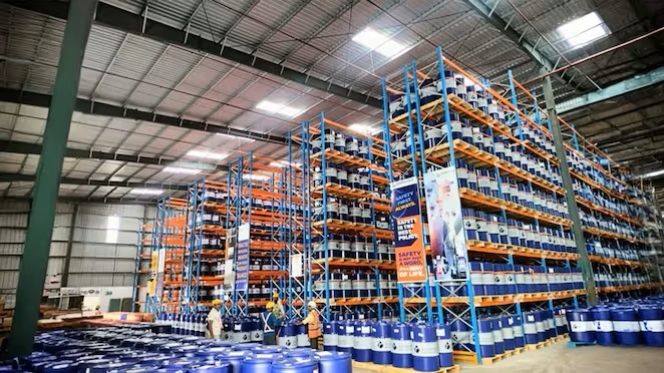
Shell Lubricants, the lubricants business of UK-headquartered Shell Group of companies, has acquired 100 percent equity stake in Raj Petro Specialities from Brenntag Group.
India is currently the world’s third-largest lubricant market and this initiative Shell expects to further expand its portfolio and customer base in the country, but also enhance its presence in the global markets.
Raj Petro is a multi-faceted petrochemical manufacturing and marketing company with business partners in about 100 countries across the globe and offers a wide range of products catering to power, energy, transport, construction, automotive, personal care, food, agriculture, pharmaceutical and other industries.
The acquisition of Raj Petro Specialities supports Shell Lubricants as it strives to grow its portfolio and customer base in India, which is one of its key growth markets.
Jason Wong, Executive Vice-President for Global Lubricants, Shell, said, “The addition of Raj Petro Specialities will help maximise value for Shell through a complementary product portfolio and increased scale of business, positioning Shell Lubricants for further growth in line with our unwavering focus on performance, discipline, and simplification.”
- SSAB
- Polmotors
- fossil-free materials
- decarbonised steel
- Vattenfall
- LKAB
- Volkswagen
- Audi
- BMW
- Peugeot
- Citroen
- Jeep
- Stellantis
- Mercedes-Benz
- Opel
- Maciej Grabos
- Robert Lewandowski
SSAB Partners Polmotors To Introduce Fossil-Free Steel Structural Automotive Components
- By MT Bureau
- June 27, 2025
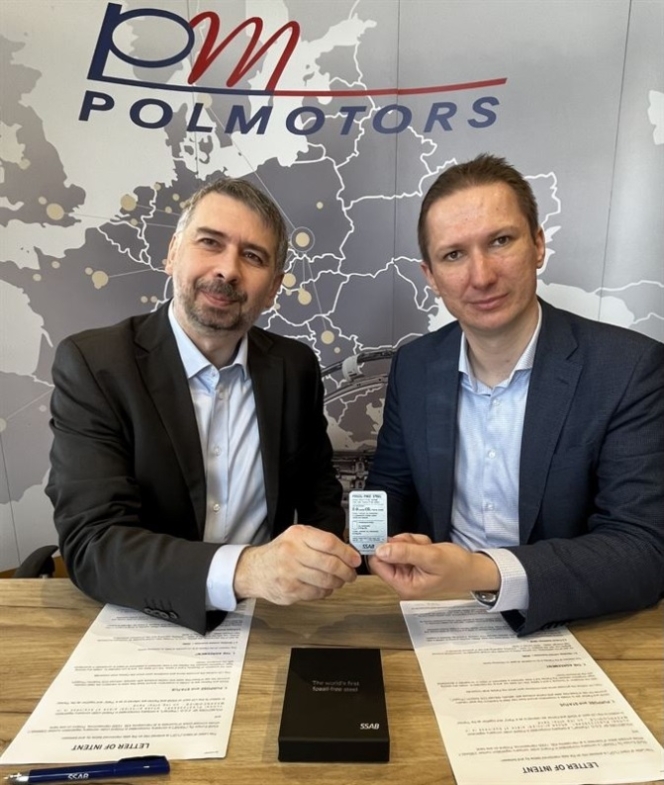
Swedish steel manufacturer SSAB has announced a new collaboration with Polmotors, a tier 1 supplier focusing on low-emission products, for exploring the potential of fossil-free materials in demanding automotive applications.
The partnership will see Polmotors explore manufacturing components using SSAB’s decarbonised steel.
SSAB is working on two unique decarbonised steels and aims to largely eliminate carbon dioxide emissions from its own operations. It has already introduced SSAB Zero, which is based on recycled steel and made using fossil-free energy. The company claims that it has also successfully produced the world’s first fossil-free steel. It works with iron ore producer LKAB and energy company Vattenfall as part of the HYBRIT initiative to develop a value chain for fossil-free iron- and steel production, replacing the coking coal traditionally used for iron ore-based steelmaking with fossil-free electricity and hydrogen. This process virtually eliminates carbon dioxide emissions in steel production.
On the other hand, Polmotors closely works with the likes of Volkswagen, Audi, BMW, Peugeot, Citroen, Jeep, Stellantis, Mercedes-Benz and Opel among others, to introduce high-performance components which are not only lighter but also greener.
Maciej Grabos, CEO, Polmotors, said, “Polmotors sees the future of fossil-free steel. And the potential competitive advantage of being an early adopter, positioning ourselves to meet the anticipated market demand from premium automotive OEMs. We design and manufacture crash management systems (CMSs) for these customers, such as bumpers and rally bars, so choice of materials is crucial. Polmotors looks forward to joint R&D – working with SSAB and the OEMs – for the implementation of new steel grades in our products.”
Robert Lewandowski, Key Account Manager, SSAB, said, “Polmotors recently celebrated its 35thanniversary. I’ve had the pleasure and privilege to meet them 20 years ago and observe how an initially small, Polish-owned enterprise turned into a global Tier1 supplier. Decarbonisation of the automotive industry requires cooperation across the supply chain where Tier 1 companies play an important role”.



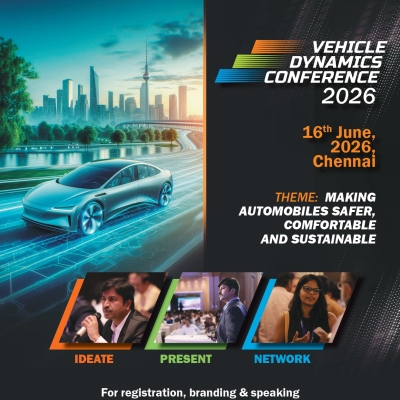
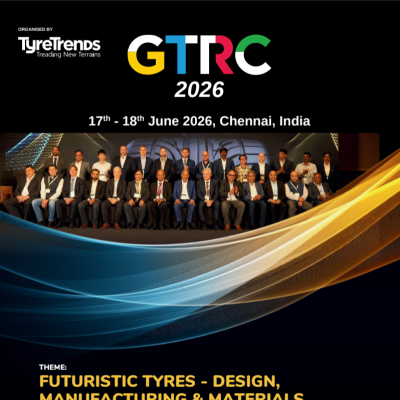
Comments (0)
ADD COMMENT